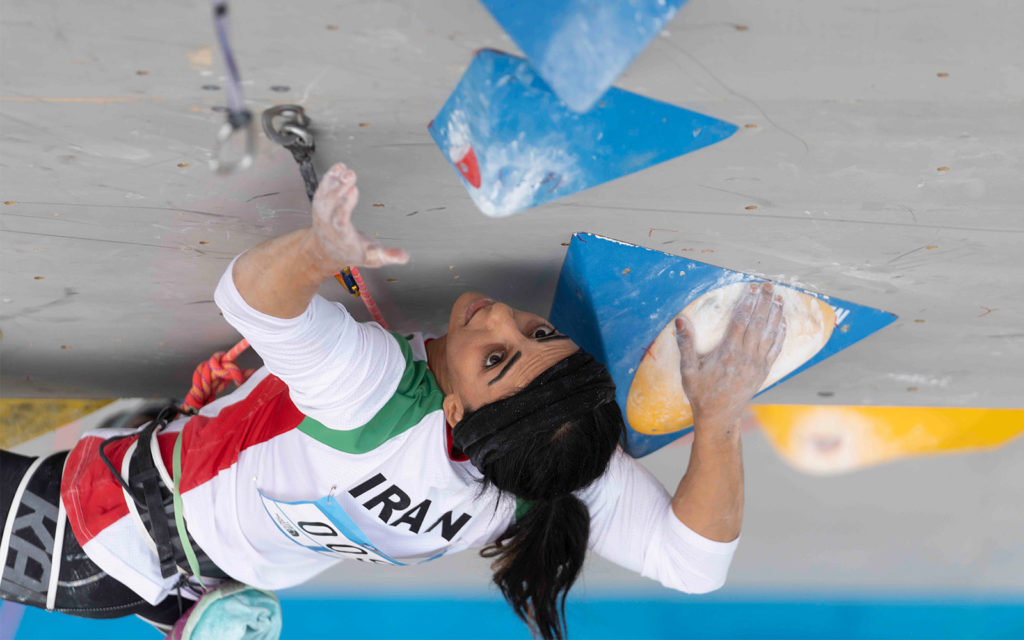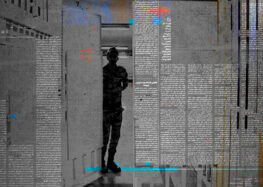Hero Climber Elnaz Rekabi Deserves Support of Climbing Organizations, International Community

International Federation of Sport Climbing Should Suspend Islamic Republic’s Membership
Serious Concerns for Rekabi, Under Extreme Pressure by State Since Competing without Hijab
October 19, 2022 – Climbing organizations and professionals, as well as the international community, should stand with professional climber Elnaz Rekabi, who is under extreme pressure by the Iranian government to cover up her heroic act of competing without a hijab earlier this week, said the Center for Human Rights in Iran (CHRI) in a statement today.
“While she was scaling that wall in Seoul without the state’s forced hijab, Ms. Rekabi was showing the world who she is: A professional climber and Iranian woman with a spine of steel,” said CHRI Executive Director Hadi Ghaemi.
“She, like countless women in Iran, has risked everything to tell the world that she opposes the state’s policy of forced hijab, and we are extremely worried about her safety,” he added.
“Ms. Rekabi risked her freedom and safety and has since been under extreme pressure by the government to cover up her courageous act of civil disobedience,” said Ghaemi. “It is now the responsibility of all people who support women’s and human rights to stand with her and not let the government in Iran cover up the true story.”
CHRI stands by Iranian athletes who are calling for the government in Iran to be held accountable for its repressive policies, and calls on the International Federation of Sport Climbing (IFCS) to suspend Iran’s membership.
CHRI also urges the IFCS, climbing professionals and the international community to not accept the Iranian government’s attempts to flip this story.
These groups and individuals should make statements in support of Rekabi, who has not been allowed to speak freely since she competed, and all women in Iran who are risking their lives to speak out against repressive state policies.
Rekabi, 33, didn’t wear the state-mandated hijab during her final climb at the International Federation of Sport Climbing’s Asia Championship on October 16, in which she finished fourth.
She competed without her hijab at a time when Iran has been roiled by nationwide, anti-state protests for weeks sparked by the death of Mahsa Amini, 22, shortly after the morality police arrested her for her alleged inappropriate hijab.
Women and girls have been at the forefront of these protests, many refusing to wear the state-mandated headscarf, and are among the more than 200 people, including 23 children, who have been reportedly killed since protests erupted a month ago.
In this context and after a video of Rekabi climbing the wall without her hair covered drew international attention, she went missing for two days, during which time she was taken to the Iranian embassy in Seoul, held for several hours, and had her passport and mobile phone confiscated, according to social media posts by people close to her.
Then, on October 19, a post appeared on her Instagram page claiming that she had “unintentionally” not worn the hijab and apologized. That post has now been removed, while images of her without the hijab remain on her Instagram page.
When Rekabi landed in Tehran, a crowd of supporters, including women without the state-mandated hijab, chanted in support of her, including “hero!” Yet she was not allowed to greet supporters and instead was whisked away by state security forces in a van with tinted windows.
State security forces did, however, force her to give an interview to state media, in which she nervously repeated some of the statements on her removed Instagram post, adding:
“I returned to Iran with peace of mind although I had a lot of tension and stress… There were some extreme reactions to this incident but so far, thank God, nothing has happened and I returned to Iran in full health and I thank the Iranian people…”
Her references to “extreme reactions” and returning in “full health” were “tacit statements to being mistreated by state security forces,” an Iranian human rights lawyer who is familiar with such cases told CHRI in confidentiality.
The government in Iran has a documented history of not only prosecuting and imprisoning women for refusing to wear a hijab, but also forcing individuals who publicly criticize state policies to publicly recant their statements or change the story under extreme duress or torture, usually in taped forced “confessions” that are later broadcast on state TV to sway public opinion in favor of the government.
In August, writer Sepideh Rashnoo was detained for defying the state’s forced hijab policy on a bus in Tehran, and was beaten in state custody.
Shortly afterwards she was charged with “assembly and collusion against national security through contacts with individuals abroad,” “propaganda against the Islamic Republic” and “encouraging (moral) corruption and prostitution” and appeared on state TV making forced statements.
“The government in Iran has turned the hijab, which should be a personal choice, into a tool of political repression,” said Ghaemi. “When women risk everything to speak out against this policy of force and repression, we should all stand with them.”
Read this article in Persian






